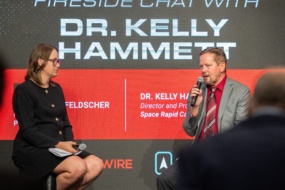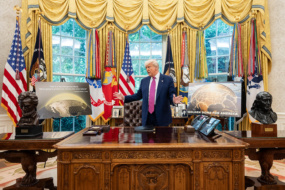The fight for NASA’s planetary science priorities has officially come to the Senate.
Sen. Mark Kelly (D-AZ) is leading a letter asking appropriators to provide $9B for NASA’s science mission directorate, according to the Planetary Society. The letter argues that investing in science is good for everything from the US economy, to national security, to the commercial industry.
“Private and commercial space organizations, while demonstrating tremendous capabilities, have neither the financial capacity nor the social responsibility to pursue breakthrough science on the public’s behalf,” the letter reads. “While we commend NASA for exploring new types of partnerships with commercial entities in space science, those same companies would lose their primary customer should proposed cuts come into effect, undercutting the emerging space economy.”
How we got here: The Trump administration’s top-line budget proposal would make significant cuts to funding for NASA’s scientific priorities including:
- A $2.27B cut to NASA’s space science budget, including cancelation of the Mars Sample Return effort
- A $1.16B cut to the agency’s Earth science division, including cutting climate-monitoring sats and restructuring the Landsat Next EO mission.
The White House proposed these cuts to partially offset a boost to human exploration of the Moon and Mars, highlighting the need to return a person to the Moon before Beijing.
The China effect: But the Senate letter framed the science budget at NASA as a way to invest in beating China in deep space. By boosting the science budget, the letter argues, the US can ensure it continues to be the first to achieve more ambitious missions—such as bringing Martian samples back to Earth, and finding signs of life in the universe.
“The nation cannot afford to surrender space to China or any other country in the pursuit of short-term, nonstrategic budget cuts,” the letter readers. “In an era of growing competition in space, investing in NASA science sends a clear message of continued US leadership and commitment to our national legacy of bold exploration.”
Responses for senators to sign on to the letter are due by Wednesday, so it’s unclear who will back the push. The China argument, however, is likely an appeal to garner some Republican support of a higher budget.
Across the Capitol: The effort to avoid science budget cuts already has bipartisan support in the House. Reps. Don Bacon (R-NE) and Judy Chu (D-CA)—co-chairs of the Planetary Science Caucus—released a statement last month sharply criticizing the proposed cuts.
“NASA science is a cornerstone of our nation’s space program, supporting thousands of jobs nationwide and driving countless scientific discoveries and technological advancements,” the statement said. “If enacted, these proposed cuts would demolish our space economy and workforce, threaten our national security and defense capabilities, and ultimately surrender the United States’ leadership in space, science, and technological innovation to our adversaries.”.




